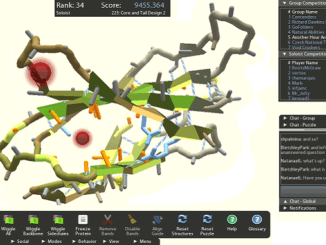
The protein folding game Foldit shows that games are an effective way to recruit, engage and organize ordinary citizens to help solve difficult scientific problems.
Modern science is filled with challenges of massive scale. From classifying terabytes of astronomical images to annotating gigabases of genome sequence, many of these challenges require enormous amounts of human effort. To address these kinds of labor-intensive problems, scientists have increasingly sought to harness the voluntary contributions of large communities of individuals from outside the traditional scientific community.
These crowdsourcing initiatives work by distributing the required cognitive labor across the minds of thousands and sometimes millions of volunteers, mirroring how the Search for Extraterrestrial Intelligence (SETI) project first distributed computational tasks across many of the world’s personal computers. This general strategy has been used successfully, for example, to classify the morphologies of uncharted galaxies [1], to conduct comprehensive ecological censuses [2], and to organize knowledge around human gene function [3]. The key challenge for these efforts to succeed is to inspire the required numbers of volunteers.
The motivations for individuals to voluntarily contribute to crowdsourcing initiatives have been widely debated, but they range from altruism, to ego, to a shared sense of purpose. One emerging trend expands that list of motivations to include the pursuit of fun and enjoyment through games. In particular, David Baker and colleagues [4] have described several success stories behind their game for protein folding, called Foldit. Among these successes, the most recent and perhaps the most groundbreaking was the development of a novel algorithm for protein folding by game players.
DOI: 10.1186/gb-2011-12-12-135
Read the full publication on genomebiology.biomedcentral.com
http://genomebiology.biomedcentral.com/articles/10.1186/gb-2011-12-12-135


